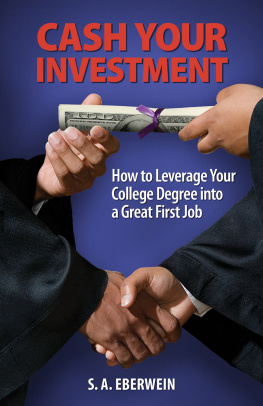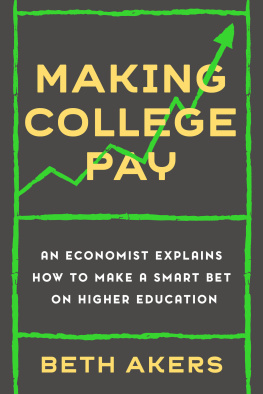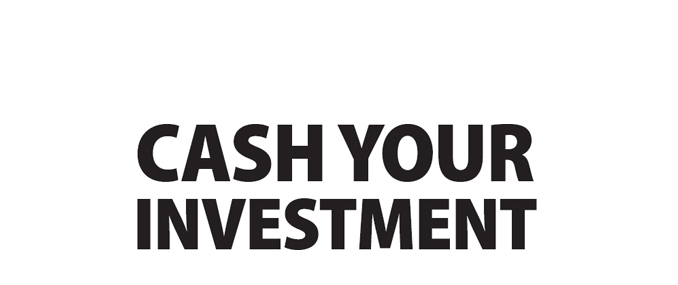2016 S. A. Eberwein
All rights reserved. No part of this book may be used or reproduced in any manner without written permission except in the case of brief quotations embodied in critical articles or reviews.
To my wife for her patience, to my parents for their continued support, to my children, to my friends (yes, including you, R. S. K.), and, of course, to my brother, without whom this book would not be possible.
Acknowledgments
A huge thanks to Milli Brown, Kathy Penny, Derek Royal, Amanda Siegfried, Rebecka Scott, Judy Hebb, Mike Towle, Danny Whitworth, Josie Gerlach, and everyone else at Brown Books who helped make this project a reality.
Special thanks also goes to Patrick Hoffman, Jeannie Cunnion, Jamey Newberg, Michael Holmes, and Eve Mayer for their contributions, inspiration, and advice.
Introduction
D uring the early stages of my job search as a college senior, I had an informational interview with a friendly junior employee from a commendable firm in my targeted corporate sector. When I arrived at his office to learn the ins and outs of his business, my chaperone described his daily duties and led me on an enlightening tour of his cubicle-packed corporate domain, affectionately referred to as the bullpen by him and his fellow junior-level troops. Escorting me around the inner workings of the company, he introduced me to co-workers and led me through other key departments, such as the companys massive sales and trading operation, which encompassed multiple floors of the building. I made mental notes of everything along the way, which helped me later at a formal interview. Although I benefited immensely from the walk-through and picked up a barrelful of insight, smack in the middle of the experience, I distinctly remember thinking, This is great and all, but what do I need to do to get a job here? What exactly do I need to do to get my foot in the door with a high-caliber firm like this? Suddenly stuck on the basic problem of catching on with a superlative employer in the first place, I quickly lost interest in seeking any further details from my gracious host on his small corner of the business.
Although I greatly appreciated the exposure, I realized straightaway that I held only a faint grasp of my forthcoming senior-year job search. I had managed a commendable grade point average. I had recently wrapped up a fruitful internship with a top-drawer business. But I remained in the dark on the steps necessary for landing top-level, post-diploma employment. I knew to make use of my campus career services center to the fullest and to check in with my personal connections, but I had no definitive blueprint for securing passage into the premium end of the professional domain. Despite four years of time, effort, and money invested in higher education, and despite my lofty aims for a post-college profession, I still faced a pronounced learning curve in landing with a blue-ribbon employer.
College can educate you on economics, mathematics, English composition, science, history, humanities, and the like, plus a kaleidoscope of advanced subjects pertinent to your major, but the experience sheds only marginal light on the subject of your senior-year job search. Despite the depth of your college grounding, your tuition nets you no definitive guidebook or concrete instruction on the subject of translating your blood, sweat, and tears from the prior four years into a gainful, career-inaugurating post within the corporate arena. College comes up short in the area of properly drilling you on the nuances of getting the most out of your hard-earned degree and steering you into a rewarding full-time career.
That is not to disparage education or diminish the value of earning a college degree in any way. The university experience obviously offers a trove of benefits. College remains a prime destination for learning and personal growtheven the majority of Ivy League institutions, which maintain a staunch emphasis on education, dont offer business degrees, as might be expected. Moreover, and most importantly, although not necessarily designed to place you on a straight-line path to a premium-wage post in the professional arena, of course, school provides you with the necessary credentials to compete for a top-end job; investing in a university pedigree obviously remains a necessity if you are to access the upper end of the white-collar domain. Clearly, individuals pulling down college diplomas have the upper hand over their unschooled counterparts when it comes to getting a topflight job.
At some point, your schooling leaves off and your professional career begins. At a certain juncture, you bear the burden of taking over the reins of your future. A bachelors degree by itself guarantees you nothing.
Of course, your undergraduate enrollment affords you access to a prime and potentially indispensable job-search resource in the form of your campus career services center, perhaps the only resource you need to link up with top employers. However, this first stop along your path to the professional sphere is not without limitation. Despite its primacy in your job-search efforts and its value to your campaign, your school job placement office remains only one field of many to mine for post-graduation opportunities.
What if your personal ambitions exceed the caliber of the offerings within your campus career services center? What if only a sparse quantity of upper-ranking firms recruit at your university during your senior year? What if your campus career services center offers none of the first-rate, entry-level positions you most covet? What if, for example, you wish to work for an established technology outfit in Silicon Valley, but no such entities recruit at your school? Topflight firms cannot realistically conduct interviews at every college campus.
Furthermore, your campus career services center remains embedded in an academic setting. Any firsthand counsel you receive regarding your future career springs from academic-ingrained voices that might be removed from the real world professional grid. Your school might not employ ex-corporate professionals capable of imparting primo instruction on the subject of how to conduct a successful, high-level employment search. If your campus career services center offers a mentor-type program that pairs you up with professionally established alumni and others from the white-collar workforce, take advantage of any such services. But you will likely need to take the initiative in seeking out firsthand guidance from productive professionals already in the workplace.
Investigate the full breadth of the offerings within your campus career services center. Even if you graduate from a commendable undergraduate program and enjoy access to a number of quality hiring firms, in the interest of maximizing your prospects to link up with premium employers, hunt for grade-A employment possibilities and guidance beyond the confines of your university.










